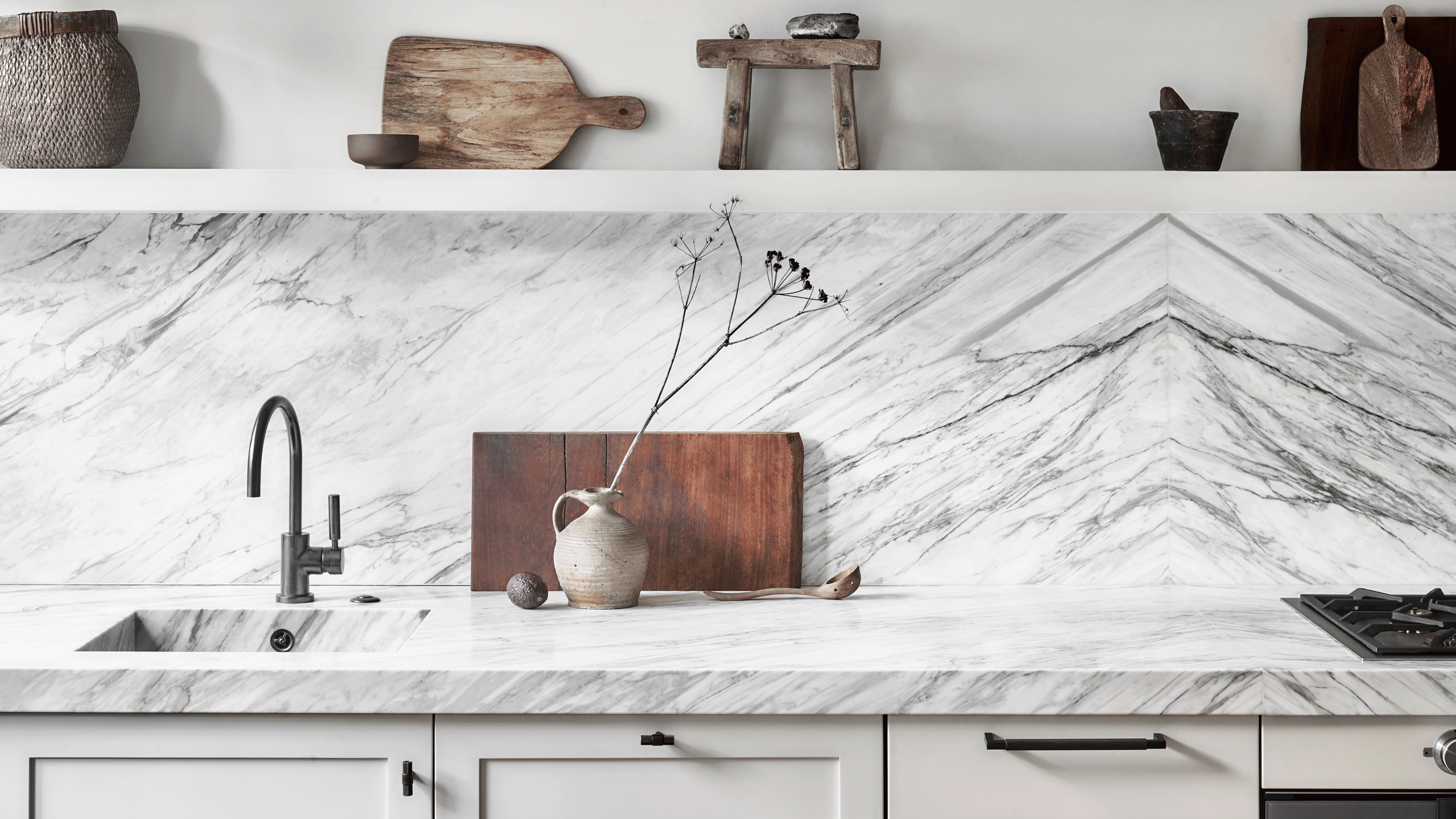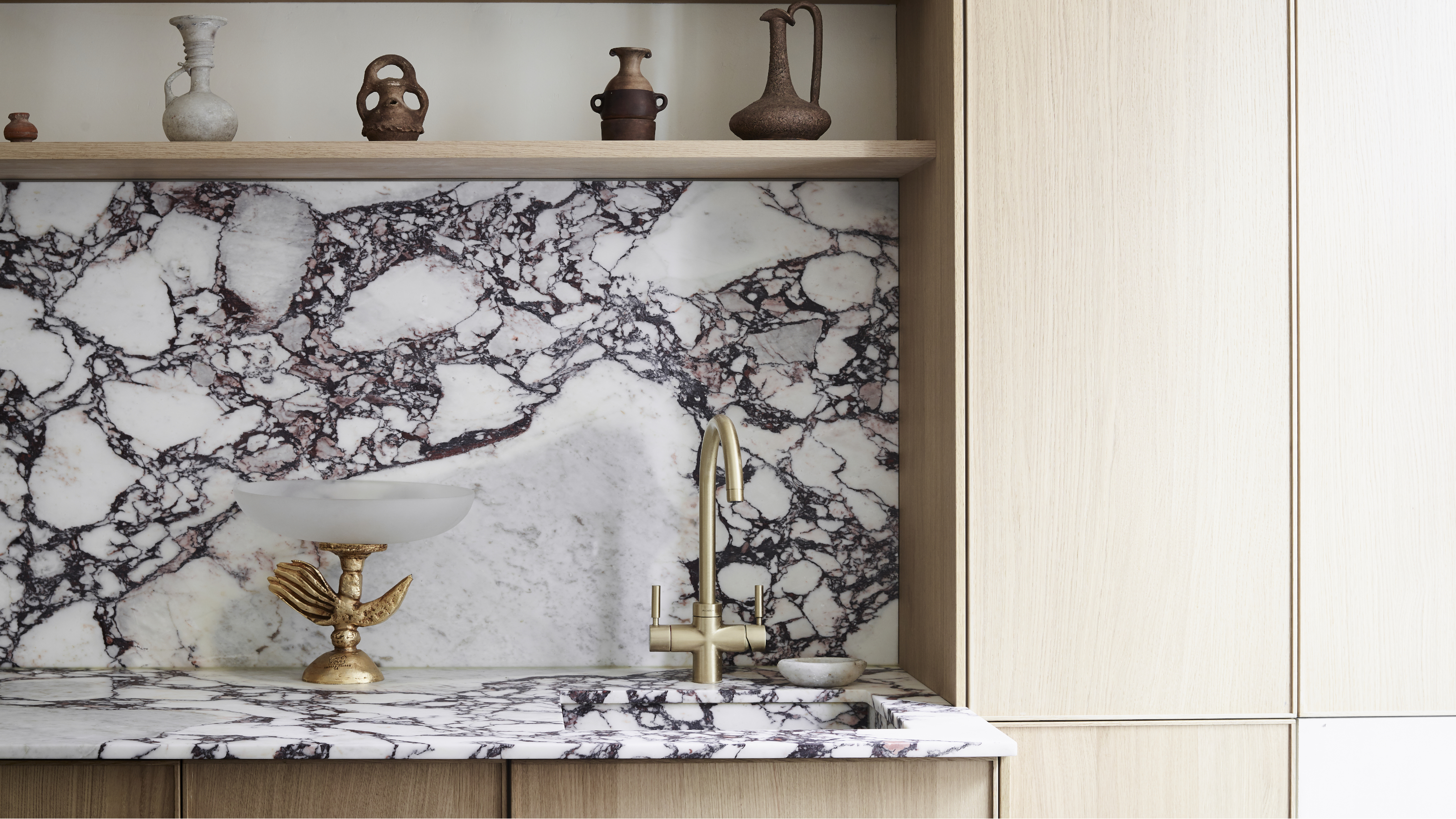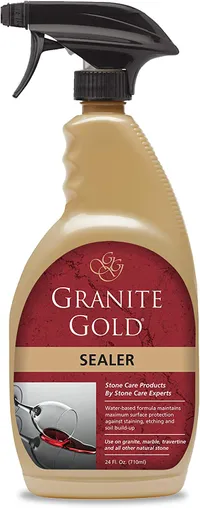This hack might have just solved the biggest drawback of trendy marble surfaces – but does it really work?
Stains on marble can really tarnish the look of your home, but this viral hack is giving us hope they can be easy to remove


When it comes to using natural stone in your home, you really can't beat marble for an on-trend look. From kitchen countertops and bathroom vanities to tabletops and floor tiles, this durable material is a popular choice thanks to its style and practicality.
One of the reasons why marble countertops are a particularly good choice for kitchens and bathrooms is because this material is water-resistant, temperature-resistant, and super easy to clean; in most cases. The thing is, while marble might look glossy and feel smooth, the stone itself is actually porous. The marble in our homes is only made waterproof through the application of a sealant. This means that water rings and other liquid stains can easily appear, especially if you have hard water in your area, as the minerals left behind can penetrate the sealant and the stone. As you can imagine, removing them is a nightmare.
If you have marble in your home, the chances are you know exactly what we're talking about. To put your struggles to rest, we've asked some experts for their insight on how to safely remove those stains once and for all. Before you splash out on a professional cleaner to do the job for you, read what they had to say below.

Lilith is an expert at following news and trends across the world of interior design. She's committed to helping readers make the best choices in their homes through sharing practical tips and solutions for all their cleaning needs. For this piece she asked experts for advice on the safest way to remove watermarks and stains from marble countertops
What will clean stains from marble surfaces?
If you're thinking of using your standard kitchen cleaner to remove a watermark from your marble, your efforts will be futile. Even the harshest products such as Bar Keeper's Friend are unlikely to do the trick.
Home improvement blogger Ruth learned this the hard way. Sharing an Instagram reel with her followers she tried a whole range of products in an attempt to remove the stain from her marble dining table including toothpaste, baking soda and a magic eraser, but to no avail.
The only solution that worked was a mixture of baking soda and hydrogen peroxide which eventually lifted the stain. The only issue was that this removed the sealant polish on the top of her table. So is it safe?
Is it safe to use hydrogen peroxide on marble?

Hydrogen peroxide is a harsh bleaching agent which is why it's so effective at removing stains. It's not surprising then that many professional cleaners do recommend it for use on marble.
The Livingetc newsletters are your inside source for what’s shaping interiors now - and what’s next. Discover trend forecasts, smart style ideas, and curated shopping inspiration that brings design to life. Subscribe today and stay ahead of the curve.
'For stubborn stains on marble, you can try using a mixture of hydrogen peroxide and baking soda,' says Benjamin Nguyen, owner of cleaning specialists Full Color Cleaners. 'Mix a solution of 3% hydrogen peroxide with a few drops of dish soap and a tablespoon of baking soda. Apply the solution to the stain, let it sit for 10-15 minutes, then wipe it away with a damp cloth.'
However, you need to know that this is likely to remove the sealant on your marble but, in this case, it might just be a necessary evil that can't be avoided.
What alternative methods are there?

If you're worried about the damage that might be caused by using hydrogen peroxide on your marble kitchen countertops, you might want to know what alternative cleaning solutions are out there - after all, marble doesn't come cheap.
'If a stain has already set, you can try cleaning with a product that has acetone in it, such as nail varnish,' suggests Jessica Samson, a cleaning expert at The Maids. 'Use a cotton ball to dip the solution in and gently dab the stain until it goes away, but avoid rubbing the stain.'
If the stain is oil-based, Benjamin suggests using a poultice. 'Mix a small amount of non-acidic cleaner with enough flour or talcum powder to form a paste then apply on the area,' he says. 'Cover it with plastic or wax paper and let it sit for a day before wiping the paste and rinsing with water.'
Are there any cleaning products that can damage marble?

To minimize the risk of damaging your marble flooring or surfaces, you should always avoid treating them with anything acidic. 'If you want to use home-based cleaning agents, never use vinegar or lemon,' says Steven, owner of cleaning service Cleanzen. These will etch into the polish and cause your marble to lose its sheen.
Steven also advises that you never use coarse brushes or scrapers to clean marble as these can strip the surface and leave marks behind. 'We recommend using a microfiber cloth or steel wool when dealing with stubborn stains,' he says.
Can you reseal marble?
The bottom line is that to remove tougher stains from marble surfaces, it's highly likely that your sealant will be removed in the process. While certainly not ideal, this isn't the end of the world as you can easily reseal marble yourself at home. In fact, most stone experts recommend sealing your marble countertops every six months or at least every year.
You can do this by purchasing a sealant like this one from Amazon. Follow the sealer label instructions for the best application as some will recommend a soft cloth while others might supply you with a foam brush. You should always apply sealant in very thin layers to help them evaporate quickly. Two coats should do the trick. Not only will a resealed marble surface be restored to its former glossy glory, but it will now be protected from any further stains. Now time to buy yourself some coasters to prevent those watermarks!
Granite Gold water-based sealant
Suitable for use on marble, Granite Gold sealant creates a protective barrier on your natural stone surfaces against oil, water, and other liquid stains while also preventing etches and soil build-up. The spray bottle makes application super simple. Just spray over your surfaces and wipe with a lint free cloth.

Lilith Hudson is a freelance writer and regular contributor to Livingetc. She holds an MA in Magazine Journalism from City, University of London, and has written for various titles including Homes & Gardens, House Beautiful, Advnture, the Saturday Times Magazine, Evening Standard, DJ Mag, Metro, and The Simple Things Magazine.
Prior to going freelance, Lilith was the News and Trends Editor at Livingetc. It was a role that helped her develop a keen eye for spotting all the latest micro-trends, interior hacks, and viral decor must-haves you need in your home. With a constant ear to the ground on the design scene, she's ahead of the curve when it comes to the latest color that's sweeping interiors or the hot new style to decorate our homes.
